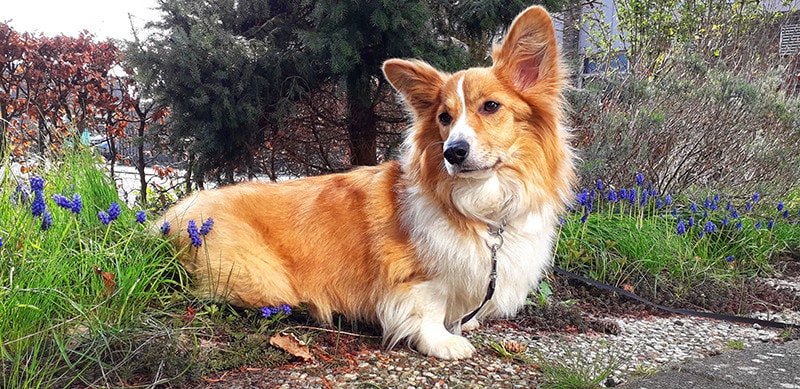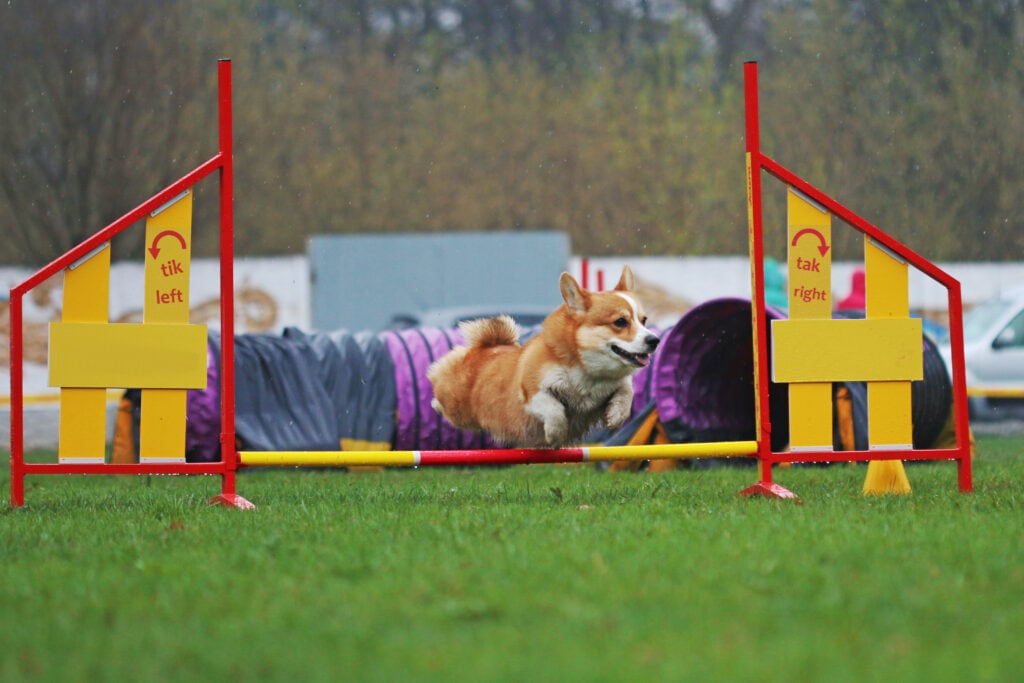
Corgis are beloved for their short stature and adorable faces. The Pembroke Welsh Corgi stands at 10–12 inches and weighs up to 30 pounds. The Cardigan Welsh Corgi is slightly larger than the Pembroke Welsh Corgi, standing at 10.5–12.5 inches and weighing up to 38 pounds. Both breeds have short, stubby legs due to genetics and intentional breeding efforts.

Genetic Reasons
A condition known as osteochondrodysplasia (OCD) is an irregularity in the growth and development of a dog’s bone and cartilage. This abnormal growth leads to bone deformities. It is a health disorder that is considered atypical. Breeds prone to this condition include Samoyeds, Pyrenees, Alaskan Malamutes, Norwegian Elkhounds, Labrador Retrievers, Scottish Deerhounds, and Basset Hounds.
A form of osteochondrodysplasia that occurs in Corgis is achondroplasia.1 The bones do not grow to a regular size due to the mutated receptor gene. Unlike osteochondrodysplasia, this shortened bone is typical of the breed. Other breeds prone to the disease include Skye Terriers and Dachshunds.
Achondroplasia is a desirable feature in breeds like the Corgi, as it is intentionally bred into the breed. However, if the condition manifests in some breeds, it is considered a genetic defect. Achondroplasia can lead to a higher chance of obesity2 and arthritis,3 but both Corgi varieties are considered very healthy.

Intentional Breeding Reasons
The Corgi’s small stature makes it adorable, but appearances aren’t the reason behind this intentional breeding decision. The Pembroke Welsh Corgi and the Cardigan Welsh Corgi were bred to herd livestock. To accomplish this task, these dogs needed to nip at the heels of livestock without being kicked or trampled. So, a short and nimble dog was needed for this purpose.
Today, Corgis are not used for herding livestock as often, but they are still bred with short legs. This is because the small stature has become a key part of the breed. A Corgi would hardly be a Corgi without the stubby legs!


Little Legs Can Lead to Big Problems
The Corgi is considered healthy, but without proper care, this dog can experience pain and fatigue. Unlike many other breeds, the Corgi is not an ideal jogging companion. It is not built for long-distance running but rather for short bursts of activity. Prolonged running can cause back and joint pain for the Corgi, so it is essential to know your Corgi’s limits while exercising.
A long-distance run that exceeds 1 mile should not be your Corgi’s first introduction to an endurance activity. Instead, slowly test your Corgi’s abilities by participating in short jogs that gradually increase in length. Pay close attention to your Corgi’s physical state, as your dog may be so eager to please you that it ignores its own pain and exhaustion to keep running.
If you go on a long run with your Corgi, ensure you are prepared.
1. Bring Water
Any dog you plan to run or walk with should have access to water. A canine water bottle is a convenient way to offer water to your pup.
2. Plan to Run on Steady Terrain
If your jogging route is uneven, rocky, or otherwise difficult to navigate, your Corgi will have a hard time. A challenging run will be even more difficult on its body.
3. Bring a Doggy Stroller
It may seem silly, but one day you may be very happy to have it. If your Corgi is exhausted, you need to be able to return him home without making him walk anymore. Likewise, if you want to continue your run but your Corgi isn’t feeling up to it, your dog can enjoy the jog from the comfort of a stroller.
4. Know Your Dog
If you can recognize the signs that your Corgi is uncomfortable, fatigued, or in pain, you will be able to respond better to its needs. Otherwise, your dog may end up getting hurt.

Good Activities for Your Corgi
Jogging is not the best activity for Corgis, at least not for long periods. Instead of running long distances with your dog, consider some of the following activities:
These short, intense activities can give your Corgi plenty of great exercises. Since Corgis were bred to be herding dogs, they are better suited to quick bursts of activity.

Conclusion
Corgis have tiny legs due to a genetic condition known as achondroplasia. This condition was intentionally bred into both breeds to make them adept herding dogs, and they were small enough to get close to livestock without being stampeded or kicked. Today, the small stature of the Corgi is seen more as an aesthetic benefit than a pragmatic one.
Featured Image Credit: Jumpstory

